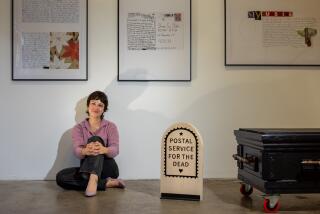Letters Remain the Warmer Way to Get the Missive Accomplished
- Share via
Just as technology has changed the nature of warfare in Iraq, it has added a new dimension to the way soldiers at the front communicate with loved ones back home.
E-mail, which was barely known during the Persian Gulf War 12 years ago, has enabled soldiers, sailors and Marines to stay in touch with family and friends as if they were in a downtown office instead of a war zone.
By enabling communication in real time, e-mail allows both sides to keep up with the minutiae of daily life, offering a special sense of closeness.
For thousands of correspondents at home, it has brought immediate relief, as each new electronic message confirms that -- for one specific moment -- a loved one is safe and out of harm’s way.
Yet for all its benefits, e-mail can sometimes seem a poor substitute for a letter.
“You can print e-mail out, but there’s a coldness to it,” said Nancy Pope, a historian for the National Postal Museum in Washington, D.C. “It looks like a memo from your boss. Pound for pound, there’s more emotional power in letters than in e-mail.”
Letters take time to write, so they naturally lend themselves to introspection and thoughtful language. As physical objects, they offer a tangible connection between the writer and recipient. And because letters are written less frequently than e-mails, there is the persistent knowledge that the words a soldier commits to paper may be the last ones read by loved ones at home.
“Letters are the one connection that remains between the front line and the home front,” said Andrew Carroll, author of “War Letters: Extraordinary Correspondence From American Wars.” “Where there’s an actual piece of paper going back and forth, there’s a tangible connection.”
Always Evolving
War letters have always changed to reflect the times in which they were written. Few people understand this as well as members of the Cooley family, a clan that has produced nine generations of soldiers who have served in seven American wars.
During the Revolutionary War, berry juice often was used in place of ink, and cloth stood in for paper when it was in short supply. The rebels, including John Alden Cooley, had to rely on lone postal riders to smuggle mail between camps of the Continental Army. Many women weren’t literate, so each letter had to be read aloud by a male relative or family friend. All these factors combined to make letters home a rare thing.
By the time of the Civil War, an independent postal service was emerging and writing had become more common.
Gilbert Cooley, a farmer from Strawberry Point, Iowa, became a captain in Iowa’s Regular Infantry. Notes to his wife, Martha, focused on life back home.
The letters would take months to arrive, delaying the pacing of the conversation between husband and wife.
As money became increasingly tight, Martha wrote about her struggles to keep the farm running. After reading about an offer to buy some of the land, Gilbert penned a simple warning.
Don’t sell the farm.
By the time Martha received the letter, 40 acres already had been sold.
During World War II, Navy aerial photographer Theodore “R” Cooley spent months flying above the sea battles in the Pacific Ocean, documenting the movements of the Japanese fleet. The family was impatient for updates but also happy to wait for a handwritten letter.
“If you got the news quickly, particularly during World War I and II, it meant you were getting a telegram,” said Carla Kaplan, an English professor at USC who specializes in correspondence. “Fast news usually meant bad news, and that someone had died.”
But technology was already beginning to depersonalize the connection between writer and reader. Eager to free up shipping space for wartime materiel, the military introduced “V-Mail.”
After the one-page letterforms were filled out, they were photographed onto microfiche. Then the film was shipped to a central base overseas, where each letter was printed out and distributed as a photograph. Soldiers could read the notes and see their loved ones’ handwriting, but they were merely copies of the real things.
During the Vietnam War, GIs dictated long messages into portable tape recorders.
First Online
Such personal cues frequently are absent in e-mail, which the military began using around the time Army Capt. Tobalina Cooley Beck was sent to Somalia in 1991.
The Prodigy online service was running a trial program called USA Connect, allowing participants to write brief notes to soldiers in the east African nation. Prodigy then forwarded the e-mails to a central military computer server in Mogadishu, where they where printed out, folded into envelopes and distributed.
Her husband, Steve Beck, signed up for the service and often typed sentences that were to the point, like in a telegram.
Everything is fine. The weather is nice. We miss you and love you.
The e-mails were appreciated, but it was the handwritten letters that Tobalina kept in her uniform pockets. Fingerprint smudges mark some notes, while a coffee ring curls around the edge of another. Such tactile reminders of home were both sustaining and bittersweet.
“It wasn’t just the words,” she said. “I could touch him. I could touch home.”
For Steve, the letters Tobalina wrote offered clues about what was really happening half a world away.
Such was the case after Beck’s team of military police guards were ambushed when they helped a transportation unit recover a damaged Humvee in Mogadishu. As they began to withdraw, hundreds of people streamed into the streets, some angrily trying to pelt the military trucks with chunks of dirty concrete. Others wielded machetes and AK-47s.
The next day, Tobalina bent over a sheet of yellow-rose stationery and crafted a letter to her husband.
My one love, I had an exciting evening last night. I went on a wild goose chase through the city looking for a disabled truck, and found the rubber of a tire, a door and a windshield -- but no truck. Oh well.
“She wouldn’t tell me much that was bad,” Steve said in their San Jose home. “And I wouldn’t write about anything other than happy things.”
Different Dynamics
That dynamic has changed with e-mail. Tobalina and her brother, Army 2nd Lt. Alex Cooley, have been carrying on an electronic conversation since Alex was shipped out early this year.
Alex grumbles about being stuck at a military hospital near the Ramstein Air Force Base in Germany, an anesthesiologist miles away from the injured on the front lines in Iraq. Beck does her best to reassure him. The casual tone of their exchange recalls the griping typically heard at a family picnic.
There have also been arguments. One of Alex’s dispatches contained a snide comment about the Middle East.
Tobalina ripped into him electronically.
I would have jumped down the throat (and have) of any soldier who said something like this.... The poorly disciplined soldier uses this as a first step in dehumanizing the enemy. Once they cease to be humans, it is easier to kill them -- and underestimate them. That kind of attitude revolts me, as an officer and a human.
They were harsh words between siblings, particularly under these circumstances. Yet Tobalina was comfortable with the tone of the conversation because she knew it would continue hours later, not end on that note.
“I never would have done that in a letter,” she said. “If that was a letter, it could have been the only thing he read from me for days or weeks.”
On Navy ships, an e-mail address is issued to each sailor and aviator on arrival, along with their berthing, linens and locker space. All the daily slots at the Internet cafe aboard the aircraft carrier Abraham Lincoln are booked a week in advance.
Tired of the wait, 21-year-old Mark Lecocq, a machinist’s mate in the reactor department, tried to find some paper and envelopes. It would be simpler to write a letter to his parents and 16-year-old brother. The trouble was, the ship’s store had run out of old-fashioned stationery.
The Navy had reduced supplies of paper and envelopes, assuming that most people would prefer to use e-mail on such a high-tech ship.
Ultimately, military personnel are never fully away from pen and pencil. On the day bombs began falling in Iraq, families at many Marine bases received an e-mail from military officials saying that electronic communication had been cut off.
Marine Sgt. Jennie Haskamp, stationed at Twentynine Palms, now checks the aluminum mailbox outside her home for word -- any word -- from her husband, 2nd Lt. Adrian Haskamp.
“I’d rather have one letter from him than 45 e-mails,” she said. She got one Saturday.
*
Times staff writer Carol J. Williams aboard the aircraft carrier Abraham Lincoln contributed to this report.
More to Read
Sign up for Essential California
The most important California stories and recommendations in your inbox every morning.
You may occasionally receive promotional content from the Los Angeles Times.










